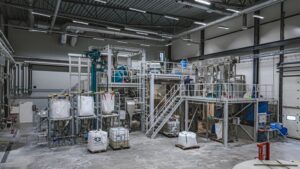A new research project from South Dakota State University’s College of Natural Sciences aims to enhance soybean plants’ natural nitrogen-fixing abilities, reducing the need for synthetic fertilizers.
Soybeans are the fourth most widely grown crop in the world, used primarily for animal feed and products like tofu and soy-based foods. In South Dakota alone, the 223,080,000 bushels harvested in 2023 were valued at over $2.76 billion, according to the U.S. Department of Agriculture (USDA).
The USDA projects that global soybean trade could increase by as much as 22% in the coming years, driven by population growth in the Global South and the increasing demand for biodiesel, which is made from soybean oil. As a result, soybeans are becoming even more valuable, especially in regions like South Dakota.
SDSU Researchers Aim to Boost Soybean Productivity
With demand for soybeans on the rise, researchers at South Dakota State University are exploring ways to boost the crop’s productivity and value for farmers, as detailed in a recent SDSU news release. Soybeans have become a cornerstone in U.S. crop rotations thanks to their ability to naturally fix nitrogen—an essential nutrient—through root structures known as nodules, which partner with bacteria to capture nitrogen from the atmosphere.
However, high-yield soybean varieties often struggle to meet their nitrogen needs during later growth stages due to the accumulation of storage proteins in seeds. This forces farmers to apply synthetic fertilizers, which are environmentally harmful and costly. Furthermore, soybeans can deplete soil nitrogen, causing long-term soil health problems.
Delaying Nodule Maturity to Increase Nitrogen Fixation
Researchers at SDSU, including Senthil Subramanian and Bhanu Petla, believe they have a solution. They hypothesize that by delaying the maturity of soybean root nodules, nitrogen fixation can continue later into the plant’s growth cycle, reducing the need for synthetic fertilizers.
“In high-yielding soybean varieties, nitrogen supplied by nitrogen fixation is not sufficient to meet the needs of the plant during reproductive stages,” Petla explained in the release. “Plants need to take up nitrogen from the soil or fertilizers, which results in poor soil health and high input costs. We want to address this by delaying nodule maturation to supply nitrogen through reproductive stages.”
“We expect to find or generate soybeans with higher nitrogen-fixing capacity through genome editing,” Subramanian added.
The Role of Hormones in Nitrogen Fixation
Previous research from the Subramanian Lab has shown that certain growth hormones—auxin and cytokinin—play a key role in nodule formation and maturation. The researchers believe that manipulating these hormones through genetic variation could lead to soybeans with a higher number of nodules that mature later, enabling better nitrogen fixation during the reproductive stages of the plant’s growth cycle.
By using CRISPR gene-editing technology, the researchers will study over 1,000 different soybean genomes to identify the specific hormone genes responsible for nodule numbers and delayed maturation. Once identified, these traits will be incorporated into elite, high-yield soybean cultivars through collaboration with breeders.
“This project will evaluate natural genetic variation in soybean germplasm related to auxin and cytokinin biosynthesis pathways and assess their impact on nodulation and nitrogen fixation capacities,” Petla said.
Reducing the Need for Synthetic Fertilizers
The ultimate goal of this research is to reduce or eliminate the need for synthetic fertilizers in soybean farming, improving both crop yields and soil health. The project, titled “Evaluation of natural and genome-edited genetic variations in auxin and cytokinin pathway genes for optimal nitrogen fixation in soybean,” will run for two years with a $300,000 grant from the USDA’s National Institute of Food and Agriculture.
“This research will help us identify natural variation in delayed nodule maturation during reproductive stages,” Petla said. “In the future, transferring this trait to elite soybean varieties will improve yields and reduce the plant’s demand for nitrogen from the soil.”
This project will contribute to a better understanding of how hormone responses influence root nodule development and soybean growth, potentially offering a sustainable solution to meet the growing demand for soybeans while preserving soil health.










